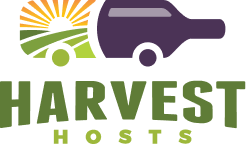Parking Your RV: A Guide to Safe and Legal Overnight Stops
TL;DR: From campgrounds to public lands and store lots, here’s how to find safe, legal, and sometimes free overnight RV parking—plus tips on avoiding legal trouble.
RVing is getting more popular for a reason: it’s a great way to travel without having to deal with flights or hotels, while being able to bring pets and all of your belongings with you. But with all of the pros, there’s one big con: figuring out how and where to park.
It can be stressful making sure you’ve booked stays in advance, and if you prefer boondocking, making sure that you’re legally allowed in the spot you chose. Crowded campgrounds and a lack of campsite availability are known to stress out most RVers, but by mixing in a variety of options, including public lands, Harvest Hosts locations, and rest stops, you will never be out of options. Read on for helpful tips that make finding safe and legal overnight stops much easier!
RV Camping Locations Available
There are so many options available to RVers in America, whether they’re in a rural area or closer to civilization. Although this isn’t a fully comprehensive list, we’ll go over four popular options, including campgrounds, public lands, and Harvest Hosts locations. For even more options, check out our Ultimate Guide to Free RV Camping.
1. Campgrounds and RV Parks
The amenities of campgrounds and RV Parks are hard to beat. With full hookups, pools, and outdoor activities, staying at campgrounds is a popular choice for a reason. But these perks add up: with nightly camping fees ranging from $30-$100 a night, staying at a campground every night isn’t economical for most.
But there are some ways to cut costs down if you’re not ready for a life of boondocking. Booking during sales and special offer periods are a great way to save in the long run. Campground discount programs like Harvest Hosts’ Campground Partners Program are another great way to go, which gives Members discounts on nightly camping fees at campgrounds across North America.
2. Public Lands
Public lands are a great way to immerse yourself in nature, unwind in a calm place at little to no cost. But you have to be comfortable with boondocking, so get ready to boondock with this checklist.
BLM lands usually offer both designated spots and open dispersed camping areas. BLM’s website can help you find safe and legal camping areas, but always be sure to check state laws to ensure you’re not overstaying your welcome.
3. Rest Stops, Truck Stops, and Store Parking Lots
Rest stops, truck stops, and Walmart parking lots are the utilitarian choice every RVer makes from time to time. It’s not the glamorous travel spot you want to stay at, but hey, it’s free and it works when your plans change last minute, or you realize you’re limited on options.
The downside is, it’s a little less secure. We recommend using iOverlander to check the legality of your chosen “informal campsites” and for reviews of truck and rest stops, so you can sleep easy without having to worry about the 2am knock.
4. Harvest Hosts
Harvest Hosts is a membership that gives RVers unlimited overnight stays at 9,000 farms, wineries, breweries, Boondocker’s Welcome locations, and more with no camping fees. It’s a great option for RVers on the go looking for unique stays and experiences.
Select Harvest Hosts locations offer up to four extra nights, water hookups, and electric hookups. Boondocking is not always required, although you must have a self-contained RV to participate. You do have to book in advance (although you can often book the same day), but with it, you get access to safe, legal, and interesting places to stay.
Understanding the Legalities of Parking Your RV
The most sure-fire way to ensure you’re always parking your RV legally, especially overnight, is by booking spots you know are RV-friendly, like campsites or Harvest Hosts locations. But in cases where that’s not always possible, you need to be aware of local ordinances that prohibit overnight parking.
\When choosing to park your RV overnight at store parking lots or opting for dispersed camping on BLM lands, look for signage that may prohibit you from being there and double-check iOverlander for guidance.
Park Your RV Responsibly
No matter where you go, whether it’s a traditional campground, a rest stop, public lands, a parking lot, or a Harvest Hosts location, it’s important to be safe. Always lock your doors, trust your gut, and check local and state laws to ensure you have the right to park your RV there.
For more RV Camping Tips, check out our Beginner’s Guide to RVing.
